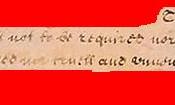The Eighth Amendment
"Excessive bail shall not be required, nor excessive fines imposed, nor cruel and unusual punishments inflicted."
Ever since the Eighth Amendment was ratified by the states in 1791, it has been a key part of our Constitution. The Eighth Amendment has protected our people from many things, including an overly high bail or "unnatural" punishments. It has ensured that in civil matters, as well as criminal cases, the people of America are protected from an overly high bail and cruel and unusual punishments. Today, the Eighth Amendment has stirred up many controversies with its many paths of interpretation, but it still remains an important part of our government under the Constitution.
The Eighth Amendment has brought up many controversies with its rather general meaning. It says that 'cruel and unusual' punishments are not allowed, but what exactly is cruel and unusual? The dictionary definition of cruel is 'so intense as to cause extreme suffering'.1
Does that mean no torture or branding? Or were they referring to something totally different? There is no way for us to explain this part of the Eighth Amendment because we simply do not know. Things that were totally normal in the 1800's seem awful now, such as hanging and cutting off limbs. But now, we use the electric chair to kill people. How is that not cruel and unusual? It is up for interpretation. The other half of the Eighth Amendment states that "Excessive bail shall not be required". To first understand this, you must know what bail is. Bail is a sum of money that a criminal defendant gives to the court to gain release from jail until the trial. The defendant must show up at trial to get their money back; if they do not come, then they shall have...


